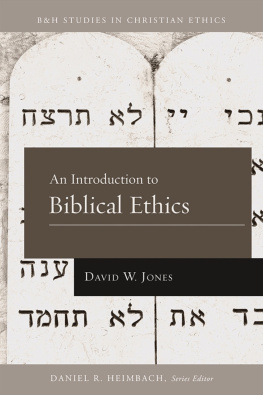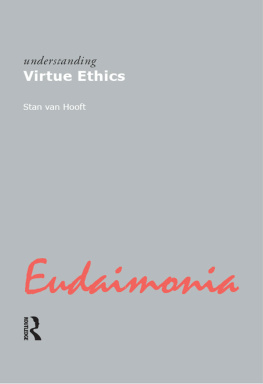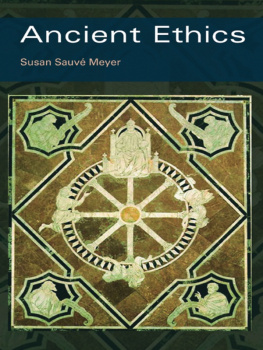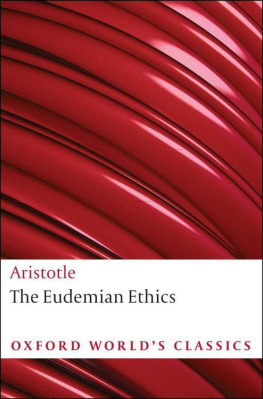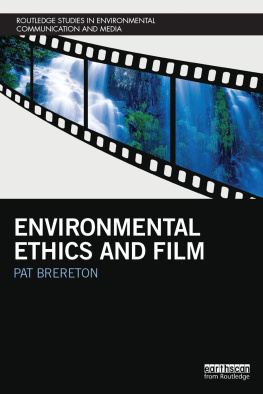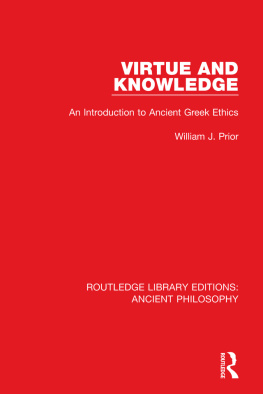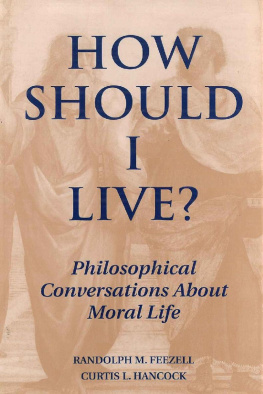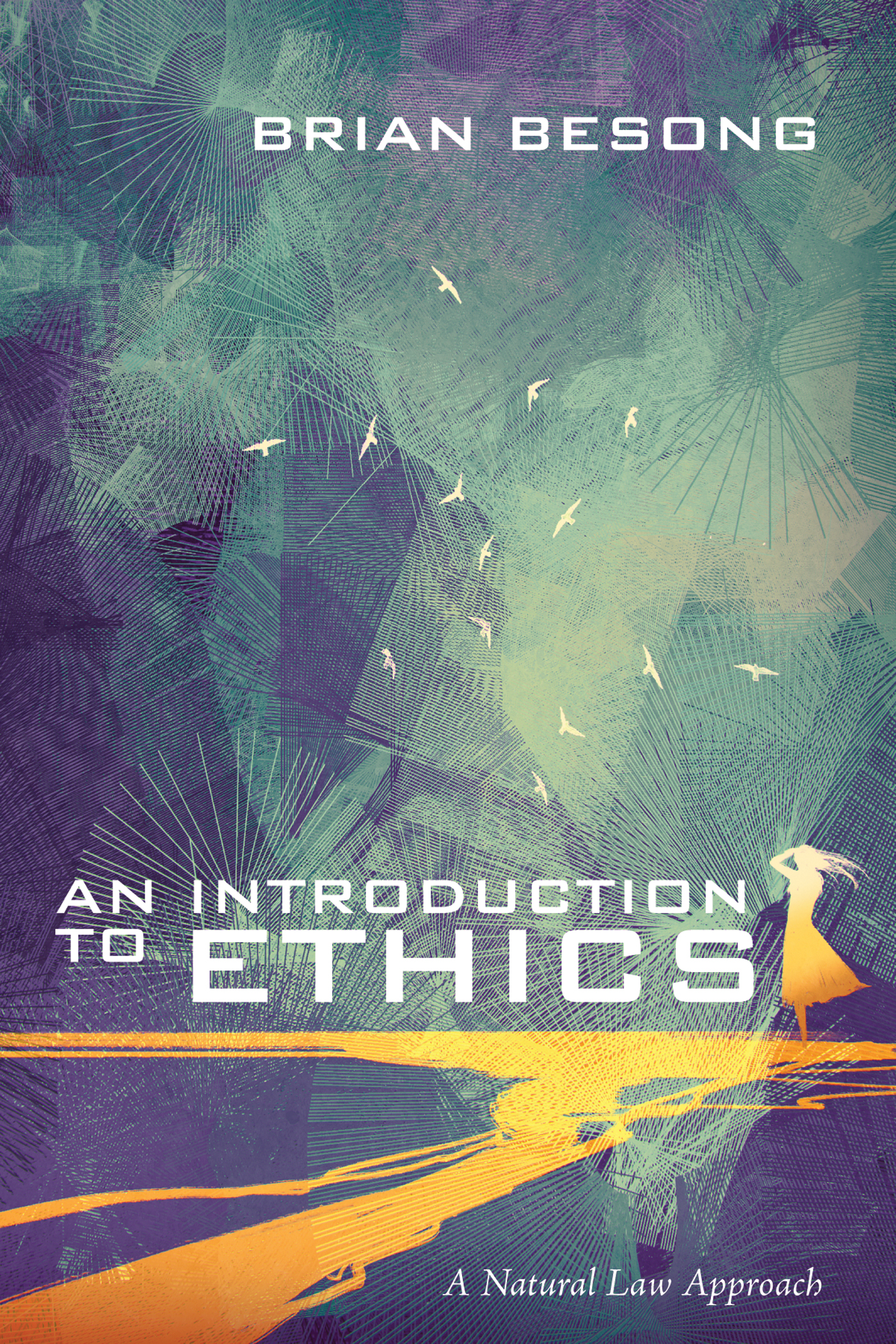Preface
I t is the goal of the present work to explain clearly and briefly to a non-philosophical audience the principles of ethics that dominated moral thinking in the West at least until the so-called Age of Enlightenment that began in late seventeenth-century Europe. During this latter period, the dominant attitude among intellectuals involved a rejection of past philosophical tradition in favor of new conclusions and arguments, which were claimed to be more solidly established on the basis of reason. In this period, it was common to find derogatory references to the whole of the medieval period as the Dark Ages or the Age of Faith.
Although phrases like these have been wholly abandoned by serious historians of the medieval period, the effects of the Enlightenments rejection of previous philosophical theorizing still linger. My aim is to remedy this in part, by synthesizing and explaining the moral theory that prevailed prior to this rejectiona theory which has come to be called natural law because of its emphasis on deriving moral conclusions from human nature. Although some contemporary philosophers are once again taking natural law accounts of ethics seriously, most often the natural law accounts they are defendingcentrally, so-called new natural law theoriesdiffer from the principles, and in some cases conclusions, of the classical theory to which they are partially indebted. These new natural law theories are characterized by an emphasis on a list of basic human goods that are incommensurable and purportedly required for a good human life. This book will ignore that approach to ethics, though I am open to the possibility that large parts of that approach are compatible with what I have to say here. It may also be that the new natural law approach constitutes a genuine rival theory to the position advanced in this book.
Exceedingly few contemporary philosophers are even passingly familiar with classical natural law theory, as philosophical training in the West has largely emphasized those ethical theories that were devised during and after the Enlightenment: utilitarianism (and more broadly, consequentialism), Kantianism, contractarianism, and contemporary versions of virtue ethics. Many contemporary philosophers, perhaps still under the influence of Enlightenment-era dismissals, are under the mistaken impression that classical natural law theory is a largely theological enterprisea project more fit for churchmen than serious philosophers. As a consequence, there are presently very few available texts that explain, let alone defend, the theory. One exception is David S. Oderbergs Moral Theory: A Non-Consequentialist Approach . Yet Oderbergs book is largely a polemical work addressed to academic audiences that, Ive found, makes for difficult reading when presented as an introduction to ethics.
In contrast, the present work will have as its target audience beginners in ethical philosophy. For this reason, I will aim to make my writing as straightforward, brief, and non-technical as possible. I will try to avoid citations and the sort of dense analysis and debate that tends to frustrate the non-academic reader. Occasionally, however, I will include a chapter section that is aimed at the more advanced reader, whose interests may have been piqued by previous sections and who wants to know more. I will adopt the technique used by Michael Huemer of marking these advanced sections off by an asterisks (*) so that those who wish to skip the marked sections may feel comfortable doing so. Skipping an advanced section will not affect a readers overall understanding of the principles of morality.
The present work is heavily indebted to the two-volume work, The Science of Ethics by Michael Cronin, which has long since fallen out of print (and is now in the public domain). Like Oderbergs contemporary defense of natural law, Cronins massive volumes are polemical, facing off against figures like Henry Sidgwick, Leslie Stephen, Francis Hutcheson, Joseph Butler, and Herbert Spencer, to name a few. Cronin also advances a positive account of natural law theory that is eminently clear and philosophically defensible. Like Cronins account, this book will not seek to be a careful reconstruction of the historical views of any particular theorist. Hence, arguments that I attribute to Aristotle or Aquinas are simplified and may not in the end be precisely what they thought or argued.
I am indebted to a number of other sources and individuals. As my goal is not so much originality as providing a useful introduction to ethics, one may often enough find overlap between what Ive written and ideas defended elsewhere by more established philosophers. Yet, I will only occasionally refer to these influences by name, when I believe this does not detract from the text, as beginning students seem to find such references tedious and distracting. I want to thank especially Rev. George Welzbacher for his careful reading and very useful comments, which have greatly improved the text. I thank Alina Beary for her suggestions pertaining to the virtues and vices. I also thank family, friends (especially Carole Peerman), and former students for their useful suggestions on making the text clearer to a broad audience. Finally, I thank Patrick Kain, whose lectures on Aristotle and Aquinas in an introductory ethics course (that I assisted with as a graduate student in 2008 ) formed a basis for the second chapter of this book and prompted me to begin thinking seriously about teleological theories in ethics.
Introduction
Oh philosophy, ruler of life! You seek out virtue and expel vice. What should we be, what would human life be, without you?Cicero ( Tusculanae Disputationes )
I n the pages of this book, it is my hope that you, the reader, will find an engaging and comprehensive introduction to morality. The principles that explain morality are exceedingly simple. They can be summarized in two words: seek happiness . But what that means in detail requires a much longer explanation, a whole book in fact. It is my hope that you will find the explanation, as well as the path to genuine happiness, clearly stated in the chapters ahead.
In some ways, books like this are a dime a dozen. There are any number of books that claim to introduce ethics. The problem is that a great many of these books do not accomplish what they claim. Rather than actually introduce ethics , these books instead introduce the reader to some small part of moral thoughta defense of the claim that morals form a genuine part of reality, sayor else they introduce the reader to a theory (or set of theories) that is capable of explaining some parts of morality while flying in the face of others. This should come as no surprise as the last several hundred years of Western philosophy have seen the rise of many competing theories of ethics, some more plausible than others.
Dont get me wrong. You will find a theory of ethics in this book. In particular, you will find the explanation of morality found in what has come to be called the natural law tradition. The explanation of morality endorsed and explained in this book is now given the name of natural law, but for much of history, it had no name other than ethicsfor most of the major philosophers in the West endorsed views that fell within this tradition, and no special title was needed. Yet, as later thinkers came up with fundamentally new theories of ethics, some name had to be given to the older and more widely-endorsed tradition.


